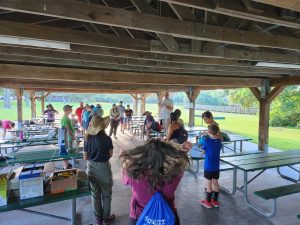
Pinellas County gladly joined the ranks of a Bee City USA in early 2023. Now, it may be confusing that a county government has applied to be a member of the Bee City initiative, but we are a special county in our state. Pinellas County is one of the smallest, yet the most densely populated county in the state of Florida. For that reason, our small, peninsular county is more like an expansive urban area of 280 square miles. Our county includes: a world-famous coastline, estuaries, upland and freshwater wetland ecosystems. These precious natural areas are fragmented and exist in-between developed cities, towns and other (24 total) municipalities.
Our residents have repeatedly ranked “the environment” as a top concern for efforts of local government to address. So much so, that’s actually how my position was created…thank you! 😉 With 20,000 acres of parks and preserves there are areas for our native bees and other pollinators to exist, but we have enthusiastically embarked on a mission to increase pollinator habitat and resources.
The working group in Pinellas County is headed up by our Parks Director, Paul Cozzie who has assembled a group of educators to bring native bee awareness to the public.
In 2023 we recruited two amazing interns from Eckerd College, and they set to work planning and executing a “Bio-Blitz Bee-Survey” at a Eagle Lake Park. There, 35 community scientists spent an early summer day collecting data: 800 observations of 292 separate species of pollinators and their host plants!!!

What is a Bio-Blitz?
As the National Geographic Society puts it, “A bioblitz is an event that focuses on finding and identifying as many species as possible in a specific area over a short period of time.” The events are not only fun, but build an incredible dataset that can be used by local scientists! A common tool for bioblitz events is iNaturalist. This is a free online tool you can use from your computer or smartphone. It allows you to upload or take a photo and their massive image database is able to help you identify the species in your image. Once you upload or submit your image and observation, it can then be verified by professionals all around the world.
And get this: according to our very own UF/IFAS Assistant Professor of Global Ecology, Dr. Corey T. Callaghan’s publication about the power of community science data, “The iNaturalist community—as of January 2022—consists of 2.5 million users…” Unfortunately, he goes on to say, “…92% of whom only observe, <1% of whom have only made identifications, and 7% of whom both observe and identify. More recruitment of identifiers is clearly needed.” The publication then explains several reasons why we should be engaged in contributing observations to iNaturalist. The good news is, we can all easily join the already 2.5 million users, and we can help make more observations possible.
Efforts and Impacts
During the month of September 2023, we promoted a county-wide and month-long “Parks for Pollinators” Bio-Blitz. This activity resulted in 183 participants making 1,013 observations of 313 species. In October the Bee City USA Team hosted a Wildflower & Pollinator Festival at Brooker Creek Preserve where 1,300 guests enjoyed activities, crafts, and native plant vendors. During the event, 80 pollinator houses were built and brought home for installation, and 500 native seed mix packets were awarded to participants who completed an educational plant quest. If all of the seeds are planted, it could result in over 1,000 sq. ft. of pollinator habitat created in the backyards of those who participated! I was a little late to planting mine, but there’s evidence of sprouts and I’m so exited!

Bee City USA
Signs advertising our county’s participation in Bee City were posted at several entrances into the county and an additional set of informational signs were created to post in county parks. These signs point observers to the website we created that houses information on how to be a good Native Bee Neighbor!
We are looking forward to more educational classes and programs this year, bringing awareness to and appreciation for our native bee residents! As a matter of fact, we just so happen to have one coming up next weekend. On Saturday, April 20th from 9am-2pm, we will be hosting our first-ever Earth Day Birthday: A Conservation Celebration event at Brooker Creek Preserve. During this event, participants will have the opportunity to build their very own pollinator house!
You can help!
From contributing images to iNaturalist to scattering native wildflower seeds to creating a Florida-Friendly landscape, every little bit we do to help our pollinators is beneficial 🙂 Bee 😉 sure to check out our Bee City website for more information and additional ways you can help.
Significant contributions for this article and all Bee City USA efforts made possible by Pinellas County’s Education & Outreach Supervisor, James Stevenson.
 3
3
